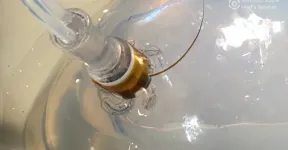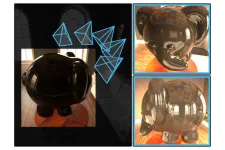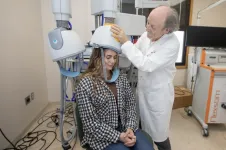(Press-News.org) Stephanie Lacour’s specialty is the development of flexible electrodes that adapt to a moving body, providing more reliable connections with the nervous system. Her work is inherently interdisciplinary.
So when a neurosurgeon asked Lacour and her team to come up with minimally invasive electrodes for inserting through a human skull, they came up with an elegant solution that takes full advantage of their expertise in compliant electrodes, and inspired by soft robotics actuation. The results are published in Science Robotics.
The challenge? To insert a large cortical electrode array through a small hole in the skull, deploying the device in a space that measures about 1 mm between the skull and the surface of the brain – without damaging the brain.
“Minimally invasive neurotechnologies are essential approaches to offer efficient, patient-tailored therapies,” says Stéphanie Lacour, professor at EPFL Neuro X Institute. “We needed to design a miniaturized electrode array capable of folding, passing through a small hole in the skull and then deploying in a flat surface resting over the cortex. We then combined concepts from soft bioelectronics and soft robotics.”
From the shape of its spiraled arms, to the deployment of each arm on top of highly sensitive brain tissue, each aspect of this novel, deployable electrode is ingenious engineering.
The first prototype consists of an electrode array that fits through a hole 2 cm in diameter, but when deployed, extends across a surface that’s 4 cm in diameter. It has 6 spiraled-shaped arms, to maximize the surface area of the electrode array, and thus the number of electrodes in contact with the cortex. Straight arms result in uneven electrode distribution and less surface area in contact with the brain.
Somewhat like a spiraled butterfly intricately squeezed inside its cocoon before metamorphosis, the electrode array, complete with its spiraled-arms, is neatly folded up inside a cylindrical tube, i.e. the loader, ready for deployment through the small hole in the skull.
Thanks to an everting actuation mechanism inspired from soft robotics, each spiraled arm is gently deployed one at a time over sensitive brain tissue. “The beauty of the eversion mechanism is that we can deploy an arbitrary size of electrode with a constant and minimal compression on the brain,” says Suhko Song, lead author of the study. “The soft robotics community has been very much interested in this eversion mechanism because it has been bio-inspired. This eversion mechanism can emulate the growth of tree roots, and there are no limitations in terms of how much tree roots can grow.”
The electrode array actually looks like a kind of rubber glove, with flexible electrodes patterned on one side of each spiral-shaped finger. The glove is inverted, or turned inside-out, and folded inside of the cylindrical loader. For deployment, liquid is inserted into each inverted finger, one at a time, turning the inverted finger right side out as it unfolds over the brain.
Song also explored the idea of rolling up the arm of the electrode as a strategy for deployment. But the longer the arm, the thicker it becomes when rolled up. If the rolled-up electrode becomes too thick, then it would inevitably take up too much room between the skull and the brain, placing dangerous amounts of pressure on the brain tissue.
The electrode pattern is produced by evaporation of flexible gold onto very compliant elastomer materials.
So far, the deployable electrode array has been successfully tested in a mini-pig. The soft neurotechnology will now be scaled by Neurosoft Bioelectronics, an EPFL spin-off from the Laboratory for Soft Bioelectronic Interfaces, that will lead its clinical translation. The spin-off was recently granted 2.5 million CHF Swiss Accelerator by Innosuisse.
END
Deployable electrodes for minimally invasive craniosurgery
2023-05-10
ELSE PRESS RELEASES FROM THIS DATE:
Study: AI models fail to reproduce human judgements about rule violations
2023-05-10
In an effort to improve fairness or reduce backlogs, machine-learning models are sometimes designed to mimic human decision making, such as deciding whether social media posts violate toxic content policies.
But researchers from MIT and elsewhere have found that these models often do not replicate human decisions about rule violations. If models are not trained with the right data, they are likely to make different, often harsher judgements than humans would.
In this case, the “right” data are those that have been labeled by humans who were explicitly asked whether items defy a certain rule. Training involves showing a machine-learning ...
Built to outlast: Body type may give athletes upper hand in certain climates
2023-05-10
Triathlons such as Ironman and Norway's Norseman competition epitomize human endurance with competitors undertaking nearly 150 miles of running, swimming and biking in grueling conditions.
But behind the training and resilience may be basic rules of ecology that help determine the victor long before contestants leave the starting line, according to research from Dartmouth.
An analysis of nearly 200 Ironman contestants over two decades suggests that performance — specifically in the marathon portion of the event — is linked to how an athlete’s physique is adapted to shedding or retaining heat in certain climates.
Published in the journal PLOS ...
Coping Under COVID: Study provides lessons from the pandemic on how to cope with large-scale traumatic events
2023-05-10
A new study in the journal PLOS ONE examines how individuals coped with stressors during the COVID-19 pandemic and which strategies were associated with higher quality of life.
The study’s findings provide important insights for both individuals and institutions as they prepare for and respond to future large-scale traumatic events. It was based on responses from more than 1,000 Americans on their experiences and behaviors during the pandemic.
The research found that problem-focused and emotion-focused coping strategies were associated with higher quality of life, while avoidant coping had a negative correlation.
Problem-focused coping involves ...
MD Anderson research highlights for May 10, 2023
2023-05-10
HOUSTON ― The University of Texas MD Anderson Cancer Center’s Research Highlights showcases the latest breakthroughs in cancer care, research and prevention. These advances are made possible through seamless collaboration between MD Anderson’s world-leading clinicians and scientists, bringing discoveries from the lab to the clinic and back.
Recent developments include a combination therapy for acute lymphoblastic leukemia, new insights into the evolution of anaplastic thyroid cancer, a promising new treatment approach for PTEN/p53-deficient pancreatic cancer, a novel pan-species artificial intelligence model to detect cancer cells, a ...
Millions of U.S. households may struggle to afford basic water services
2023-05-10
A new analysis suggests that about one in seven households across the U.S. may face financial hardship in paying for access to water and wastewater services. Lauren Patterson and colleagues at Duke University, North Carolina, present these findings in the open-access journal PLOS Water.
U.S. households pay utilities for access to water for drinking, cooking, cleaning, and sanitation, as well as for wastewater services. However, in recent years, the cost of these services has increased alongside a widening income gap, fueling affordability concerns. ...
Data from Argonne’s Advanced Photon Source provides foundation for first US approved RSV vaccine
2023-05-10
Respiratory syncytial virus (RSV) is a highly contagious disease that affects millions of people each year around the world, resulting in an estimated 160,000 deaths. In the United States, severe RSV causes 6,000 to 10,000 deaths among people 65 years of age or older.
On May 3, the U.S. Food and Drug Administration approved Arexvy, an RSV vaccine developed by pharmaceutical company GSK plc, formerly GlaxoSmithKline plc. It is the first RSV vaccine to be approved in the United States, and according to GSK’s press release, the first for older adults to be approved anywhere in the world. This is a ...
New procedure allows micro-printing inside existing materials with greater accuracy
2023-05-10
3D printers form objects by layering melted plastic or metal, but this only works on large scales. What you need to fabricate microdevices for which the layering step is not feasible? What if it were possible to print directly into the bulk of an existing three-dimensional material?
The research groups of Lynford Goddard and Paul Braun, professors at the University of Illinois Urbana-Champaign, have been collaborating to develop such a process. They use the technique of multiphoton lithography to print inside an existing ...
Purdue April Consumer Food Insights report explores role of dollar stores in food landscape
2023-05-10
Purdue April Consumer Food Insights report explores role of dollar stores in food landscape
A market for an expanded grocery selection at dollar stores potentially exists, especially with consumers who live less than 10 minutes away, according to data reported in the April Consumer Food Insights report.
The survey-based report out of Purdue University’s Center for Food Demand Analysis and Sustainability assesses food spending, consumer satisfaction and values, support of agricultural and food policies, and trust in information sources. Purdue experts conducted and evaluated ...
Using reflections to see the world from new points of view
2023-05-10
As a car travels along a narrow city street, reflections off the glossy paint or side mirrors of parked vehicles can help the driver glimpse things that would otherwise be hidden from view, like a child playing on the sidewalk behind the parked cars.
Drawing on this idea, researchers from MIT and Rice University have created a computer vision technique that leverages reflections to image the world. Their method uses reflections to turn glossy objects into “cameras,” enabling a user to see the world as if they were looking through the “lenses” of everyday objects like a ceramic coffee mug or a metallic ...
Stimulating hope: Personalizing treatment options for depression
2023-05-10
Artificial intelligence. Gene editing. mRNA vaccines. It’s safe to say the past few decades have felt like the next big wave of medicine. However, what continues to be needed in virtually every field is a personalized approach to care.
That’s certainly needed when it comes to using transcranial magnetic stimulation (TMS) to treat depression, said Medical University of South Carolina Distinguished University Professor Mark George, M.D.
TMS uses a magnet to increase brain activity in ...







